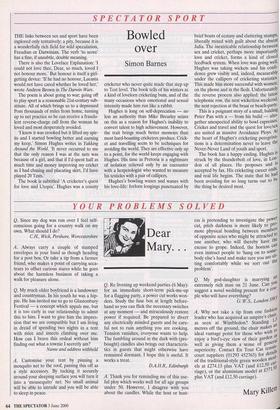SPECTATOR SPORT
Bowled over
Simon Barnes
THE links between sex and sport have been explored only tentatively: a pity, because it is a wonderfully rich field for wild speculation, Freudian or Darwinian. The verb `to score' has a fine, if unsubtle, double meaning.
There is also the Lovelace Explanation: 'I could not love thee, Dear, so much, loved I not honour more.' But honour is itself a girl- getting device: 'If he had no honour, Lucasta would not have cared whether he loved her,' wrote Andrew Brown in The Darwin Wars.
The poem is about going to war; going off to play sport is a reasonable 21st-century sub- stitute. All of which brings us to a depressed Porn thousands of miles from home, turning up to net practice so he can receive a fraudu- lent reverse-charge call from the woman he loved and most desperately avoided.
I knew it was crooked but it lifted my spir- its and I started bowling better and earning my keep,' Simon Hughes writes in Yakking Around the World. 'It never occurred to me that the only reason I was at the nets was because of a girl, and that if I'd spent half as much time and money improving my cricket as I had chasing and placating skirt, I'd have played 20 Tests.'
The book is subtitled 'A cricketer's quest for love and Utopia'. Hughes was a county cricketer who never quite made that step up to Test level. The book tells of his winters as a kind of lovelorn cricketing bum, and of the many occasions when emotional and sexual intensity made him run like a rabbit.
Hughes is long on self-deprecation — no less an authority than Mike Brearley seizes on this as a reason for Hughes's inability to convert talent to high achievement. However, the trait brings much better memoirs than most hard-boasting cricketers produce. Crick- et and travelling seem to be techniques for avoiding the world. They are effective only up to a point, for the world keeps engaging with Hughes. His time in Pretoria is a nightmare of isolation relieved only by an encounter with a herpetologist who wanted to measure his testicles with a pair of callipers.
Hughes's bowling waxes and wanes with his love-life: forlorn longings punctuated by brief bouts of ecstasy and clattering stumps, liberally mixed with guilt about the absent Julia. The inextricable relationship between sex and cricket, perhaps more importantly love and cricket, forms a kind of closed feedback system. When love was going well, Hughes was taking wickets and his confi- dence grew visibly and, indeed, measurably under the callipers of cricketing statistics. This made him more successful with women, on the phone and in the flesh. Unfortunately the reverse process also applied: the latest telephonic row, the next wicketless weekend, the next rejection at the braai or beach-partY- This is a poignant story of a small, balding Peter Pan with a — from his build — alto- gether unexpected ability to bowl expresses. Cricket and travel and the quest for love/sex are united as massive Avoidance Ploys. At the heart of Hughes's cricketing peregrine" tions is a determination never to leave the Never-Never Land of youth and sport. The book has a happy ending. Hughes Is struck by the thunderbolt of love, in Lon" don of all places. He proposes and is accepted by fax. His cricketing career ends: and real life begins. The state that he had been avoiding for so long turns out to be the thing he desired most.





































































 Previous page
Previous page